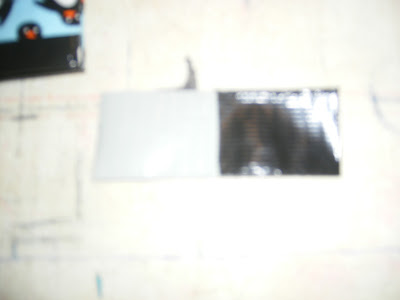I needed a new wallet...
Now that the school year is over, I figured it is time to catch up on some of the personal projects for myself that I have been putting off. I purchased this awesome penguin duct tape a while back and didn't have time to make anything. Whoever thought to make penguin duct tape was obviously thinking of me. Now all they have to do is make the penguins red and we're all set. Anyway, I needed a simple wallet for my essentials that would fit in my back pocket. This way I don't have to carry around a purse when I'm out. The following is a tutorial of what I came up with.
Like I said in my last post, if you don't have a cutting mat you can use a kitchen cutting board. I've been using this one for years and it has served me well. While making this project, I also discovered that a utility knife works well for cutting the duct tape.
Now for the other side. I decided that this piece was going to be the inside, so I wasn't concerned with lining up the pattern. As you can see the pattern is not continuous. In order to make the same size swatch I only had to use three 14 inch pieces of tape.
Stick the front and the back piece together. The best way to do this is to lay one side sticky side up and hold the other piece above. Line it up as best as you can. Start lowering the piece in the center first and work your way to the edges. If it is not perfect, don't worry, there's a way to fix that and i'll get to that later. Put the outside face down and fold in both sides so there is a small space in the middle.
These folds will eventually become the pockets. Now, take a piece of another color duct tape and cut it to the length of the edge of the pockets. I like to use a solid color that is in the pattern. I thought using the entire width of one piece was to large for the edging of this project so I cut the piece in half longways.
Use these two pieces to cover the edges. Half should be on the inside and half on the outside. See how it covers up the rough edges that you may have had on there before? I told you we would get to fixing the edges up.
Now reinforce the inside of the pockets. To do this, cut a piece of duct tape that is the same as the top and bottom of the pockets. Again, cut this piece in half so you can use it for the top and the bottom of one pocket.
Open up the pocket and stick one piece so it is halfway on the edge then fold it over. This part can be a little tricky, but luckily you're not sticking it to another sticky piece. So you can easily remove this piece if you are not satisfied. Close the pocket, then repeat for the bottom.
Repeat for the other pocket. Now for the outside edging. Measure a piece of duct tape that is the entire length of the wallet and cut that piece in half. Take one piece and stick it on one side so half of the piece is hanging off. I was more concerned with the length of edging on the outside of my wallet so I first stuck my edging piece there. I wanted it to be shorter than half of a piece.
Almost done!
This is the view on the other side.
I can whip one of these out in 10 or 15 minutes. Of course I've had a lot of practice, but I definitely recommend this for a beginner. It may take a little time at first but it's so worth it, especially with all of the awesome patterns that are out there now!
















No comments:
Post a Comment